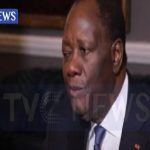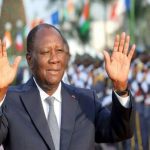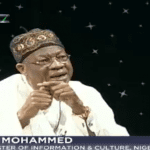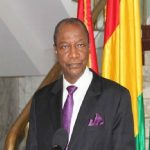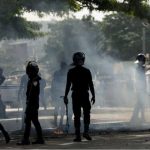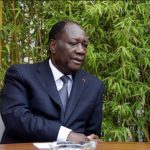The President of Côte d’Ivoire, Alassane Ouattara’s decision to run for a third term in office violates the constitution and will destabilize a country still recovering from civil war, his opponents said over the weekend.
In a speech on Thursday evening, Ouattara went back on an earlier pledge and said he would run in the Oct. 31 election, drawing accusations that he is following in the footsteps of other African leaders who have manipulated constitutions to hang onto power.
Côte d’Ivoire law limits presidential terms to two, but Ouattara says that a new constitution adopted in 2016 acted as a reset button, allowing him to run again.
Even before Ouattara’s announcement, the vote was seen as a stern test of Ivory Coast’s stability. Ouattara’s first win in 2010 sparked a brief civil war that killed about 3,000 people when his predecessor Laurent Gbagbo refused to accept his loss.
Politicians from that era, including Gbagbo, are still vying for power and influence, which has revived old political tensions.
“President Ouattara is sowing the seeds of the destabilization of Ivory Coast,” Maurice Kakou Guikaoué, the executive secretary of the opposing Democratic Party of Ivory Coast (PDCI), told Radio France Internationale (RFI).
A leading civil society coalition called for nationwide protests, but opposition politicians did not, instead suggesting they would use peaceful, democratic means to block Ouattara’s path.
The President of Côte d’Ivoire, Alassane Ouattara’s decision to run for a third term in office violates the constitution and will destabilize a country still recovering from civil war, his opponents said over the weekend.
In a speech on Thursday evening, Ouattara went back on an earlier pledge and said he would run in the Oct. 31 election, drawing accusations that he is following in the footsteps of other African leaders who have manipulated constitutions to hang onto power.
Côte d’Ivoire law limits presidential terms to two, but Ouattara says that a new constitution adopted in 2016 acted as a reset button, allowing him to run again.
Even before Ouattara’s announcement, the vote was seen as a stern test of Ivory Coast’s stability. Ouattara’s first win in 2010 sparked a brief civil war that killed about 3,000 people when his predecessor Laurent Gbagbo refused to accept his loss.
Politicians from that era, including Gbagbo, are still vying for power and influence, which has revived old political tensions.
“President Ouattara is sowing the seeds of the destabilization of Ivory Coast,” Maurice Kakou Guikaoué, the executive secretary of the opposing Democratic Party of Ivory Coast (PDCI), told Radio France Internationale (RFI).
A leading civil society coalition called for nationwide protests, but opposition politicians did not, instead suggesting they would use peaceful, democratic means to block Ouattara’s path.
The President of Côte d’Ivoire, Alassane Ouattara’s decision to run for a third term in office violates the constitution and will destabilize a country still recovering from civil war, his opponents said over the weekend.
In a speech on Thursday evening, Ouattara went back on an earlier pledge and said he would run in the Oct. 31 election, drawing accusations that he is following in the footsteps of other African leaders who have manipulated constitutions to hang onto power.
Côte d’Ivoire law limits presidential terms to two, but Ouattara says that a new constitution adopted in 2016 acted as a reset button, allowing him to run again.
Even before Ouattara’s announcement, the vote was seen as a stern test of Ivory Coast’s stability. Ouattara’s first win in 2010 sparked a brief civil war that killed about 3,000 people when his predecessor Laurent Gbagbo refused to accept his loss.
Politicians from that era, including Gbagbo, are still vying for power and influence, which has revived old political tensions.
“President Ouattara is sowing the seeds of the destabilization of Ivory Coast,” Maurice Kakou Guikaoué, the executive secretary of the opposing Democratic Party of Ivory Coast (PDCI), told Radio France Internationale (RFI).
A leading civil society coalition called for nationwide protests, but opposition politicians did not, instead suggesting they would use peaceful, democratic means to block Ouattara’s path.
The President of Côte d’Ivoire, Alassane Ouattara’s decision to run for a third term in office violates the constitution and will destabilize a country still recovering from civil war, his opponents said over the weekend.
In a speech on Thursday evening, Ouattara went back on an earlier pledge and said he would run in the Oct. 31 election, drawing accusations that he is following in the footsteps of other African leaders who have manipulated constitutions to hang onto power.
Côte d’Ivoire law limits presidential terms to two, but Ouattara says that a new constitution adopted in 2016 acted as a reset button, allowing him to run again.
Even before Ouattara’s announcement, the vote was seen as a stern test of Ivory Coast’s stability. Ouattara’s first win in 2010 sparked a brief civil war that killed about 3,000 people when his predecessor Laurent Gbagbo refused to accept his loss.
Politicians from that era, including Gbagbo, are still vying for power and influence, which has revived old political tensions.
“President Ouattara is sowing the seeds of the destabilization of Ivory Coast,” Maurice Kakou Guikaoué, the executive secretary of the opposing Democratic Party of Ivory Coast (PDCI), told Radio France Internationale (RFI).
A leading civil society coalition called for nationwide protests, but opposition politicians did not, instead suggesting they would use peaceful, democratic means to block Ouattara’s path.
The President of Côte d’Ivoire, Alassane Ouattara’s decision to run for a third term in office violates the constitution and will destabilize a country still recovering from civil war, his opponents said over the weekend.
In a speech on Thursday evening, Ouattara went back on an earlier pledge and said he would run in the Oct. 31 election, drawing accusations that he is following in the footsteps of other African leaders who have manipulated constitutions to hang onto power.
Côte d’Ivoire law limits presidential terms to two, but Ouattara says that a new constitution adopted in 2016 acted as a reset button, allowing him to run again.
Even before Ouattara’s announcement, the vote was seen as a stern test of Ivory Coast’s stability. Ouattara’s first win in 2010 sparked a brief civil war that killed about 3,000 people when his predecessor Laurent Gbagbo refused to accept his loss.
Politicians from that era, including Gbagbo, are still vying for power and influence, which has revived old political tensions.
“President Ouattara is sowing the seeds of the destabilization of Ivory Coast,” Maurice Kakou Guikaoué, the executive secretary of the opposing Democratic Party of Ivory Coast (PDCI), told Radio France Internationale (RFI).
A leading civil society coalition called for nationwide protests, but opposition politicians did not, instead suggesting they would use peaceful, democratic means to block Ouattara’s path.
The President of Côte d’Ivoire, Alassane Ouattara’s decision to run for a third term in office violates the constitution and will destabilize a country still recovering from civil war, his opponents said over the weekend.
In a speech on Thursday evening, Ouattara went back on an earlier pledge and said he would run in the Oct. 31 election, drawing accusations that he is following in the footsteps of other African leaders who have manipulated constitutions to hang onto power.
Côte d’Ivoire law limits presidential terms to two, but Ouattara says that a new constitution adopted in 2016 acted as a reset button, allowing him to run again.
Even before Ouattara’s announcement, the vote was seen as a stern test of Ivory Coast’s stability. Ouattara’s first win in 2010 sparked a brief civil war that killed about 3,000 people when his predecessor Laurent Gbagbo refused to accept his loss.
Politicians from that era, including Gbagbo, are still vying for power and influence, which has revived old political tensions.
“President Ouattara is sowing the seeds of the destabilization of Ivory Coast,” Maurice Kakou Guikaoué, the executive secretary of the opposing Democratic Party of Ivory Coast (PDCI), told Radio France Internationale (RFI).
A leading civil society coalition called for nationwide protests, but opposition politicians did not, instead suggesting they would use peaceful, democratic means to block Ouattara’s path.
The President of Côte d’Ivoire, Alassane Ouattara’s decision to run for a third term in office violates the constitution and will destabilize a country still recovering from civil war, his opponents said over the weekend.
In a speech on Thursday evening, Ouattara went back on an earlier pledge and said he would run in the Oct. 31 election, drawing accusations that he is following in the footsteps of other African leaders who have manipulated constitutions to hang onto power.
Côte d’Ivoire law limits presidential terms to two, but Ouattara says that a new constitution adopted in 2016 acted as a reset button, allowing him to run again.
Even before Ouattara’s announcement, the vote was seen as a stern test of Ivory Coast’s stability. Ouattara’s first win in 2010 sparked a brief civil war that killed about 3,000 people when his predecessor Laurent Gbagbo refused to accept his loss.
Politicians from that era, including Gbagbo, are still vying for power and influence, which has revived old political tensions.
“President Ouattara is sowing the seeds of the destabilization of Ivory Coast,” Maurice Kakou Guikaoué, the executive secretary of the opposing Democratic Party of Ivory Coast (PDCI), told Radio France Internationale (RFI).
A leading civil society coalition called for nationwide protests, but opposition politicians did not, instead suggesting they would use peaceful, democratic means to block Ouattara’s path.
The President of Côte d’Ivoire, Alassane Ouattara’s decision to run for a third term in office violates the constitution and will destabilize a country still recovering from civil war, his opponents said over the weekend.
In a speech on Thursday evening, Ouattara went back on an earlier pledge and said he would run in the Oct. 31 election, drawing accusations that he is following in the footsteps of other African leaders who have manipulated constitutions to hang onto power.
Côte d’Ivoire law limits presidential terms to two, but Ouattara says that a new constitution adopted in 2016 acted as a reset button, allowing him to run again.
Even before Ouattara’s announcement, the vote was seen as a stern test of Ivory Coast’s stability. Ouattara’s first win in 2010 sparked a brief civil war that killed about 3,000 people when his predecessor Laurent Gbagbo refused to accept his loss.
Politicians from that era, including Gbagbo, are still vying for power and influence, which has revived old political tensions.
“President Ouattara is sowing the seeds of the destabilization of Ivory Coast,” Maurice Kakou Guikaoué, the executive secretary of the opposing Democratic Party of Ivory Coast (PDCI), told Radio France Internationale (RFI).
A leading civil society coalition called for nationwide protests, but opposition politicians did not, instead suggesting they would use peaceful, democratic means to block Ouattara’s path.



